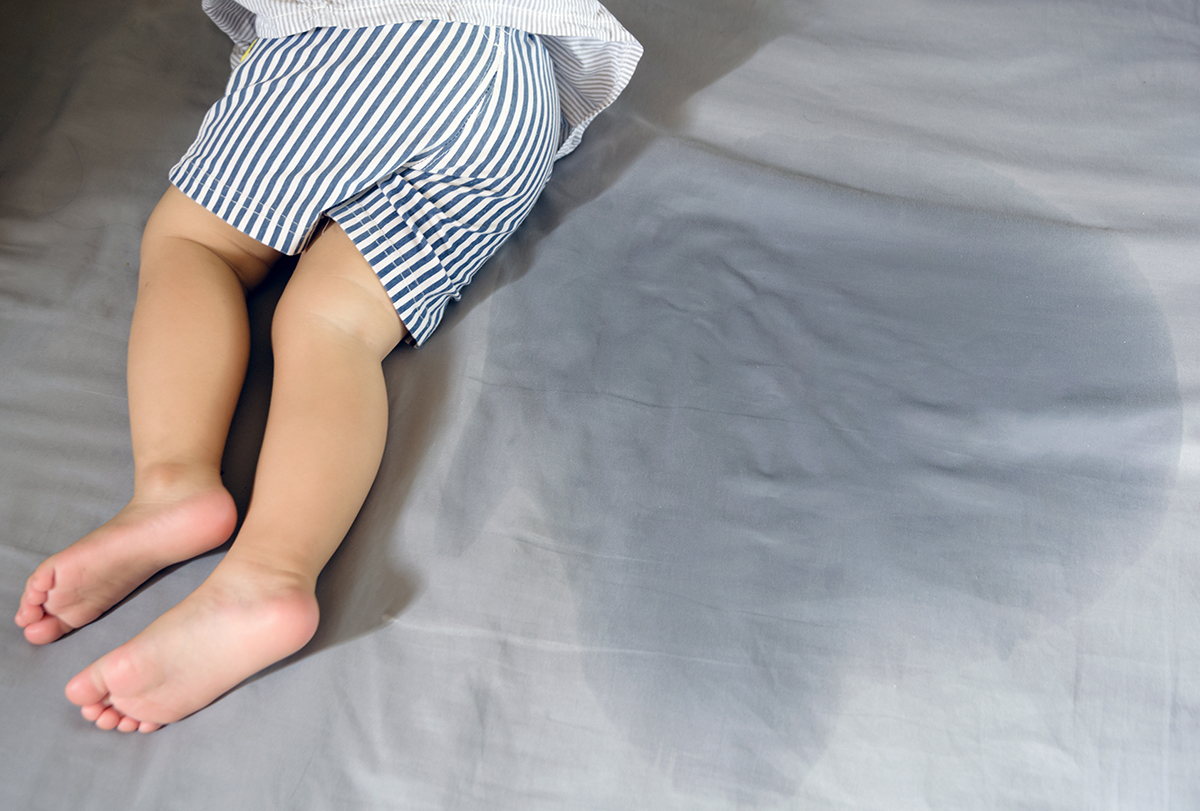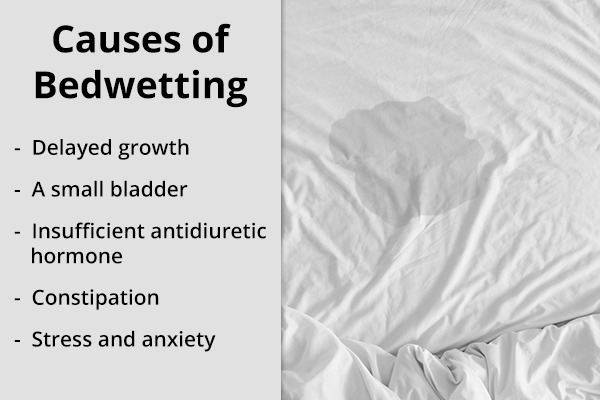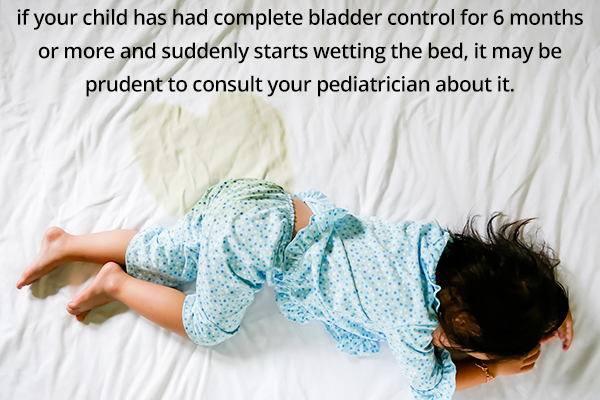In this article:
Bedwetting, medically referred to as nocturnal enuresis, occurs when a child who is old enough to remain dry through the night unknowingly passes urine while sleeping.

Although frustrating, such accidents are common among children during the potty-training years. Typically, urinary incontinence is not considered a cause of concern unless the child is over 5 years old and wets the bed more than once a week for at least 3 months. (1)
That said, bedwetting in children does not qualify as a legitimate medical condition, but rather a challenging inconvenience for both the child and parents.
The standard age for toilet training is between 2 and 4 years and learning to control bladder function when asleep is usually the final stage of this process.
Bladder control requires the muscles, nerves, spine, and brain to be completely in sync, and acquiring this coordination can be easier for some kids than others. One must realize that every child develops at his/her own rate and cannot be rushed into developing nighttime bladder control.
Moreover, a lot of parents lose patience and start blaming the child for bedwetting, assuming it to be a deliberate act of laziness or attention-seeking behavior.
The embarrassment and discomfort associated with bedwetting can be a lot for young children to handle, and assigning guilt in this misguided manner will only send them further in their shell.
Simple Ways to Deal With Bedwetting in Children
Children often outgrow bedwetting as they age, but it can negatively affect their self-esteem while it lasts. The child might feel awkward and embarrassed and shy away from social activities such as slumber parties and camping sessions.
It is the responsibility of the parents to reassure their child that bedwetting is a normal part of growing up, which will eventually pass. It is very important to hold your cool no matter how flustered you might feel about the extra washing.
You can help your child stop wetting the bed with some easy and simple tips.
1. Encourage bladder exercises to enhance bladder capacity

Bladder exercises help stretch the muscle that controls the release of urine from the bladder and increase bladder capacity. Muscle-strengthening and bladder-stretching exercises are considered good for bladder control. (2)
- Have your child do a muscle-strengthening exercise that involves tightening the pelvic muscles, holding the position for 5 to 10 seconds, and then resting for 5 seconds. This exercise has to be repeated 10 times, thrice daily.
- Encourage your child to hold off going to the bathroom for some time when the urge to urinate begins. This method may be more beneficial for accidental daytime wetting than nighttime but can help reduce the frequency of bedwetting episodes. It usually trains the bladder to hold an increased amount of urine without triggering the urge to urinate, thus helping children to hold their urine for 2 to 3 minutes more, each day.
Note: Holding in urine for long may not be a good idea as the bladder can become a breeding ground for bacteria.
2. A bedwetting alarm is an effective tool
Electronic bedwetting alarms detect wetness and trigger an alarm if the child starts to pee. The alarm is designed to wake the child as soon as the very first drops of urine come out.
This way, the child can stop the urine flow and then go to the toilet – on their own or with the help of their parents. Over time, the child should learn to wake up whenever their bladder gets too full before the alarm goes off.
There are various types of bedwetting alarm systems, including underwear with built-in sensors, mats with built-in sensors, and mini-alarms that can be put inside the child’s underwear or pajamas. (3)
3. Suo Quan, a Chinese herbal medicine might work
Suo Quan is widely used to treat frequent urination, enuresis, and other diseases caused by kidney deficiency. Suo Quan is a mixture of Alpinia oxyphylla Miq., Dioscorea opposita Thunb., and Radix Linderae, prepared at a ratio of 1:1:1, and is used to warm the kidneys and expel cold while relieving frequent urination by stopping leakage.
Various forms of Suo Quan are available, such as pills, capsules, tablets, and decoctions. (4)
4. Give your child cranberry juice

This remedy is effective if bedwetting is due to urinary infection. Consult with your child’s doctor and then give your child a ½ cup of cranberry juice three times a day.
Cranberry juice is good for the bladder and urinary tract. It is highly recommended for children with bedwetting problems. (5)
Although most liquids should be avoided soon before bed, you can give your child 1 cup of fresh cranberry juice 1 hour before going to bed. Repeat this process daily for at least a few weeks.
What Causes Children to Wet the Bed?
No child wets the bed of his/her own accord. There are a number of reasons that explain the tendency of children to involuntary release urine while sleeping, which include:

- Delayed growth. Young children do not have a fully developed nervous system, and bedwetting often occurs when the nerves that are responsible for bladder control are slow to mature. Children, particularly deep sleepers, with a weak nervous response are unable to tell when their bladder is full.
- A small bladder. Some children have a low capacity to hold urine due to underdeveloped or small-sized bladders.
- Insufficient antidiuretic hormone. The antidiuretic hormone produced by the body regulates the amount of urine released by the kidneys. There is a natural spike in this hormone during the night, which is why people tend to produce less urine when they are asleep. Some children who are prone to bedwetting, however, have low levels of this hormone and continue to produce more urine at night than others.
- Constipation. Bedwetting is a common by-product of constipation in young children because of the pressure exerted by the bowel on the bladder.
- Stress and anxiety. In some cases, deeper emotional or psychological stress due to some dramatic events in the child’s life can set back the normal development of nighttime dryness. Anything from the birth of a new sibling, undergoing illness, and starting a new school to sleeping away from home and witnessing parental discord or separation can trigger bedwetting episodes.
Most cases of bedwetting are reported in children who are deep sleepers, such that they do not wake up even when their bladder is full and involuntarily release urine in their sleep. They go to bed dry and wake up wet without the slightest recollection of when and how it happened the next day.
While such leaks are a common occurrence during the early years of a child’s life, in some cases the problem may persist longer. If your child fails to outgrow this condition beyond 7 years of age, a visit to the doctor is warranted.
If the pressure starts getting to you or your child seems to be taking this problem too hard, you can always trust a doctor to guide and support you and your child through the journey.
How Can You Help Your Child Overcome Bedwetting?
Here are a few ways to make it easier for your child to cope with bedwetting: (6)
- As your child might feel conscious about this condition, try not to talk about his/her bedwetting in front of others.
- Recount stories about how other family members struggled with bedwetting when they were young to comfort your child. This will help normalize the problem and make your child feel less alone in the struggle.
- You can make your child wear absorbent underwear, also known as pull-ups, to keep their skin and beds dry in the event of a nighttime accident.
- Anxiety and stress tend to make bedwetting worse. So, instead of blaming or punishing your child, treat your child with love, support, and attentiveness to relieve their embarrassment.
- Encourage your child to use the bathroom just before bedtime, as sleeping with an empty bladder will help minimize the risk of nighttime accidents. If your child has already gone to sleep before you called it a night, there’s no point in waking him/her up to go to the toilet as a precautionary measure. The child will not urinate on your call, and this will only disrupt his/her sleep.
- Install nightlights to help your child easily locate the bathroom when he/she is woken by an urge to urinate.
- Make sure that your child has easy access to the bathroom at night by installing a low-rise bed that is easy to get in and out of and clearing the path between the bed and the toilet to avoid tripping accidents.
- Offer simple reinforcements or rewards when your child has a dry night, and don’t be too harsh on the bad ones.
- Encourage your child to drink more fluids during the morning and afternoon but limit fluid intake during the last few hours before turning in for bed. The likelihood of bedwetting is naturally increased when the child goes to sleep with a full bladder.
- Avoid giving your child caffeinated beverages, even hot chocolate, as caffeine is a known diuretic that stimulates urine production.
- Treat constipation. Urine control and stool elimination use the same muscles. With chronic constipation, these muscles become dysfunctional and contribute to bedwetting.
- Keep your child’s bedding linen comfortably dry through the night by using under-pads or disposable bed chucks that absorb the urine and minimize the need for cleanup after an accident.
- Cover your child’s mattress with a waterproof plastic sheet to prevent any liquid damage to the mattress and extend its shelf life.
- Place a bath towel under the bedsheet to soak in the urine in case of a leak.
When Is Bedwetting a Medical Problem?

If your child has always lacked nighttime bladder control and has failed to stay dry overnight for 6 months or more, it is referred to as primary bedwetting. This form of urinary incontinence usually has no medical, emotional, or behavioral causes.
However, if your child has had complete bladder control for 6 months or more and suddenly starts wetting the bed, it may be prudent to consult your pediatrician about it. The secondary form of bedwetting often stems from an underlying medical condition such as urinary tract infection (UTI), constipation, bladder problems, diabetes, and severe psychological stress.
Medical problems that might cause your child’s bedwetting tendency to make a comeback often exhibit other symptoms, some of which are listed below:
- Unexplained changes in the volume and frequency of urination during the day
- Painful or burning sensations while urinating
- Straining to urinate
- Wetting accidents during the day
- Snoring
- Swollen feet or ankles
- A very small or narrow stream of urine
- Constantly dribbling urine or dribbling just after urination
- Urine or bloodstains on the underpants
- Daytime and nighttime wetting
- A sudden change in personality or mood swings
- Lack of bowel control
- Unusual thirst
- Fever
- Involuntary urine release after any form of physical strain such as coughing, running, or lifting
- Unusual gait due to difficulty walking, which might indicate an underlying neurological problem
- Continuous dampness
If you detect any of these signs, get your child evaluated by a pediatrician right away.
The doctor will examine your child’s kidneys or bladder more closely for any physical problem that needs to be addressed. Depending upon the complexity and severity of the problem, the doctor may refer you to a pediatric urologist, who is specially trained to treat children’s urinary problems.
What Are the Risk Factors for Bedwetting in Children?
Several factors can make your child more susceptible to bedwetting, which includes:
- Genetic predisposition. The tendency to wet the bed after the age of 5 usually runs in the family. If either or both parents wet the bed as children, it is highly likely that their child will be a bedwetter too. Additionally, there is an increased risk of bedwetting when the child has at least one sibling or extended family member who used to do it beyond the age of 5.
- Attention-deficit/hyperactivity disorder (ADHD). Children with ADHD are more prone to bedwetting than others.
- Gender. Although bedwetting is a common childhood problem that afflicts both sexes, it is far more prevalent among boys than girls. In fact, the incidence of bedwetting cases in boys is almost double than that in girls.
Final Word
Bedwetting is not a problem that can be solved in a day or two. Be patient and allow these remedies time to work and your child’s natural development process to take its course.
Young children are unlikely to be bothered by bedwetting accidents unless the parents make a big deal about it. They are perceptive beings and can pick up on their parent’s critical tones, which only add to their guilt and embarrassment.
It’s best to be gentle, patient, and understanding while helping your child grow out of this developmental phase. To keep them from feeling ashamed and alienated on account of bedwetting accidents, it is essential to reassure children that there is nothing wrong with them and they are not the only ones who are going through this stage.
Involve your child in the treatment process. It may help to chart their progress by marking dry and wet nights. Allow your child to put stars, stickers, or any other positive symbol on the chart to commemorate the dry nights.
Celebrating every stepping stone in your child’s journey will motivate him/her to keep on trying. You can even reward your child with little treats for having dry nights.
If all your efforts to control bedwetting continually go in vain, you should seek professional help from a doctor, as suggested by a 2017 study published in the British Medical Journal. (7)
- Was this article helpful?
- YES, THANKS!NOT REALLY



